Is Your Scalp Greasy No Matter What You Do?
You’ve just washed your hair, and by the next morning, it feels greasy, limp, and unmanageable. Sound familiar? An oily scalp is more than just a cosmetic issue — it can lead to discomfort, itching, and even hair loss if left untreated. It’s a common concern for people with overactive sebaceous glands, and it often feels like a never-ending battle.
Why You’ll Love This Guide:
- Expert-backed, clinically accurate advice
- Natural, easy-to-follow home remedies
- Product & treatment recommendations from dermatologists
- Prevention strategies to stop oiliness at the root
Let’s break down what’s really going on with your scalp — and how to fix it, once and for all.
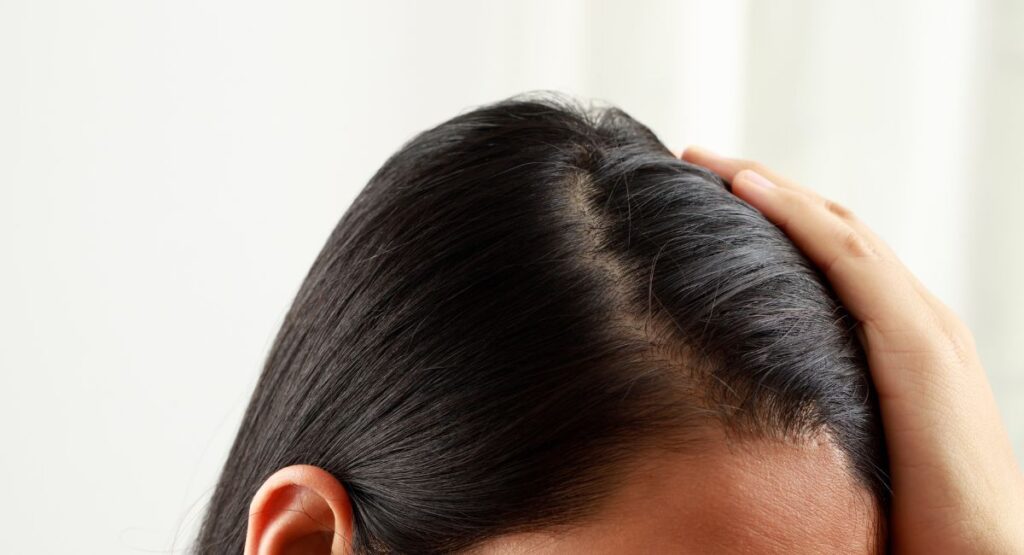
Understanding the Problem: What Is an Oily Scalp?
An oily scalp occurs when the sebaceous glands on your scalp produce excess sebum, the natural oil meant to hydrate and protect your skin and hair. While sebum is essential, too much of it causes a greasy scalp, dull-looking hair, clogged follicles, and sometimes dandruff or scalp acne.
What It Looks Like:
- Hair that looks dirty shortly after washing
- Greasy residue on fingers after touching scalp
- Itching, irritation, or scalp breakouts
- Flaky dandruff mixed with oil
Common Triggers:
- Hormonal fluctuations (puberty, menstruation, PCOS)
- Over-washing (which strips natural oils and triggers rebound oiliness)
- Genetics
- Heavy hair products or silicone-based shampoos
- Humidity and environmental stress
- Poor diet (excess sugar, dairy, or fried foods)
👉 Related: How to Treat Dark, Flaky Skin Effectively — similar root cause: oil imbalance and inflammation.
Medical Solutions for Oily Scalp: Dermatologist Recommendations
If you’ve tried everything at home without success, medical treatments can target the root causes.
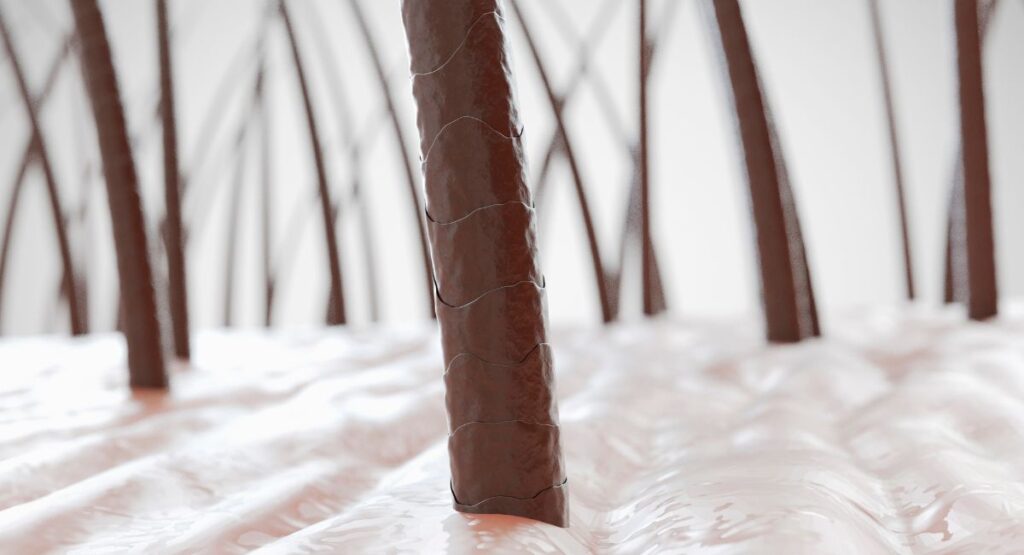
1. Medicated Shampoos
- Ingredients to look for: Salicylic acid, ketoconazole, zinc pyrithione, selenium sulfide
- Top Picks:
- Neutrogena T/Sal Therapeutic Shampoo
- Nizoral Anti-Dandruff Shampoo
- Head & Shoulders Clinical Strength
2. Topical Treatments
- Clindamycin solution or salicylic acid gels for oily scalp acne
- Minoxidil may be used in cases of seborrheic hair loss (only under medical guidance)
3. In-Office Treatments
- Scalp exfoliation or hydrafacial for the scalp
- Laser therapy to reduce inflammation and improve scalp health
- Prescription retinoids to control sebum (in severe cases)
⚠️ Note: Don’t overuse medicated shampoos. They can dry and irritate your scalp. Always consult a dermatologist first. (Health line)
Home Remedies: Natural Ways to Control an Oily Scalp
These DIY remedies are gentle, effective, and backed by natural science.
1. Apple Cider Vinegar (ACV) Rinse
- Why it works: Balances scalp pH, controls sebum
- How to use: Mix 1 part ACV with 3 parts water, rinse scalp after shampoo
- ⏱️ Use 2-3 times/week; results in 2 weeks
2. Aloe Vera Gel
- Why it works: Soothes inflammation, regulates oil
- How to use: Apply fresh gel directly to the scalp, leave for 20 minutes before rinsing
- ⏱️ Use twice weekly; noticeable changes in 3-4 weeks
3. Green Tea Scalp Spray
- Why it works: Rich in antioxidants, reduces oiliness
- How to use: Brew strong green tea, cool, and spritz on scalp after washing
- ⏱️ Daily use; improvement seen within 10 days
4. Tea Tree Oil
- Why it works: Antibacterial, anti-sebum effects
- How to use: Mix 3 drops with 1 tbsp carrier oil (like jojoba), massage into scalp
- ⏱️ Apply twice weekly; results within 3-4 weeks
5. Lemon Juice and Yogurt Mask
- Why it works: Lemon exfoliates, yogurt nourishes
- How to use: Mix 1 tbsp lemon juice with 2 tbsp plain yogurt, apply for 15 mins, rinse
- ⏱️ Once a week; effective in 2–3 uses
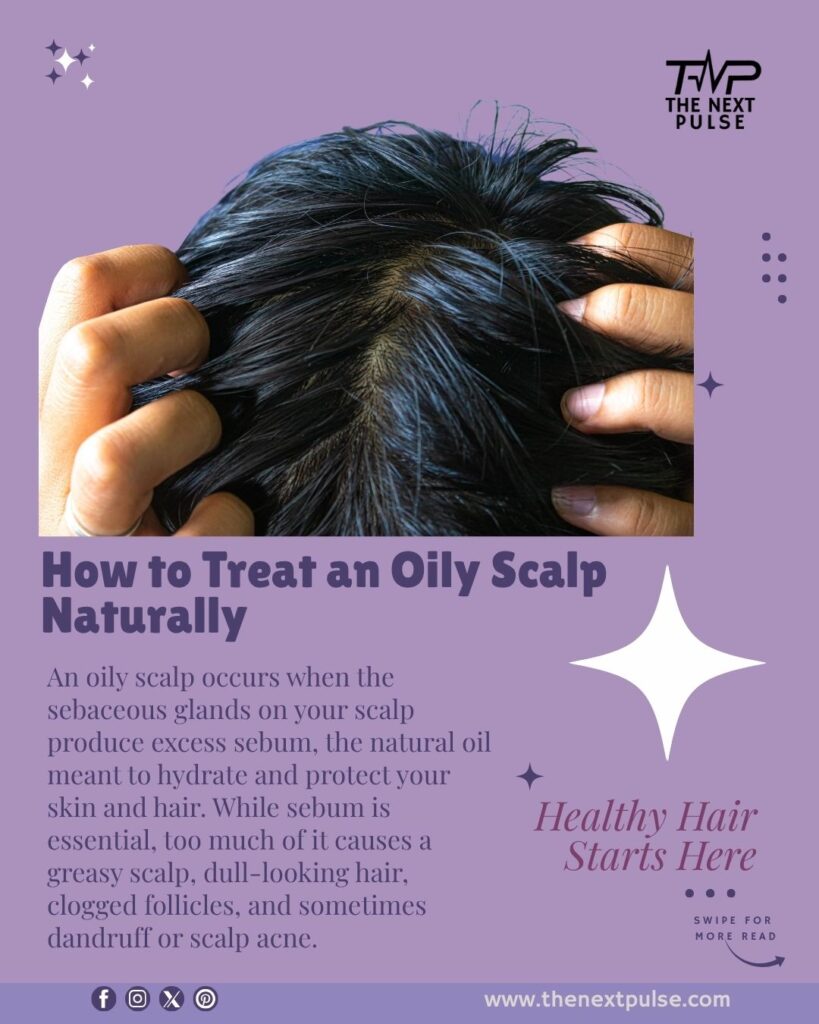
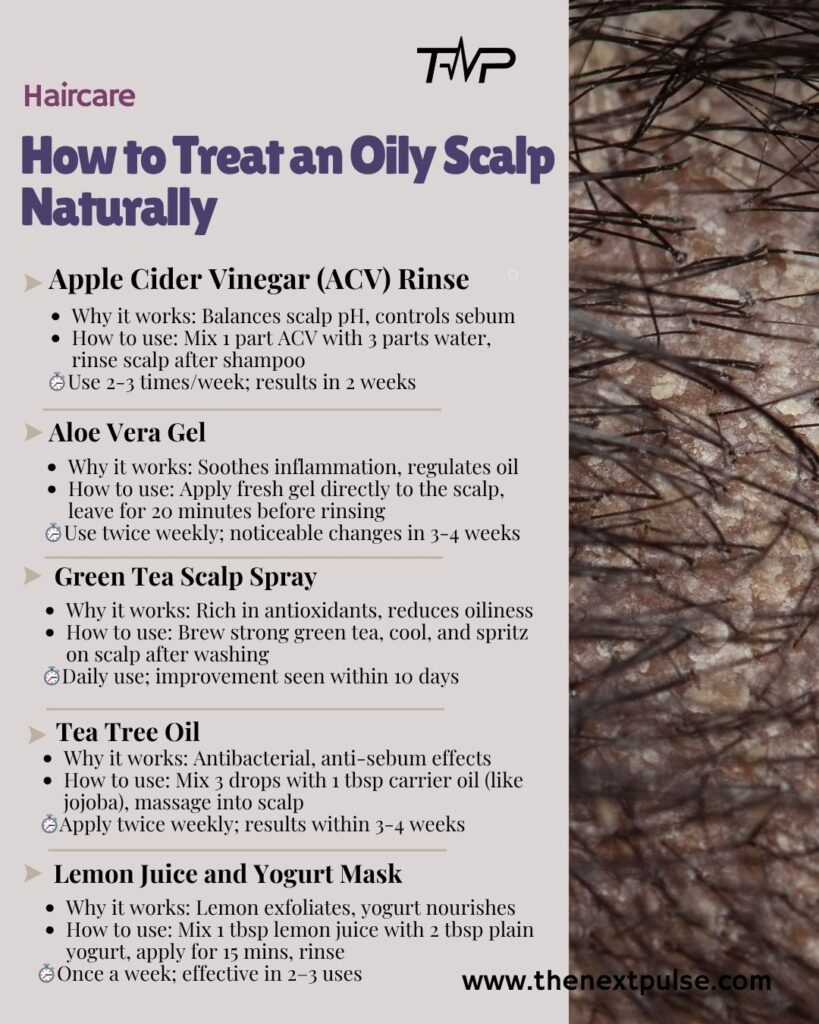
Treat an Oily Scalp Naturally
Additional Tips: Prevention & Lifestyle Adjustments
Scalp Care Routine
- Avoid daily washing; opt for 2–3 times per week
- Choose lightweight, sulfate-free, clarifying shampoos
- Rinse thoroughly to avoid buildup
- Use a gentle scalp exfoliator once a week
Check out this: Weighted Hula Hoop Weight Loss: Does It Really Work? — small daily habits can create big changes, just like scalp care consistency.
Diet Matters
- Reduce sugar, dairy, and processed fats
- Eat more omega-3s, zinc, and vitamin B-rich foods
Stress Control
- Practice mindfulness, meditation, or regular exercise
- Stress increases cortisol, which stimulates oil glands
🧠 Want to boost your mental clarity? Read: Is a Cold Plunge Really Good for Your Health? — it connects directly to stress relief and wellness.
💡 Pro Tip:Avoid touching your hair throughout the day. Your fingers carry oil and bacteria that can transfer to your scalp and trigger even more sebum production.
FAQs
1. Can stress really make my scalp oilier?
Yes! Stress increases cortisol levels, which directly stimulate sebaceous gland activity.
2. Should I wash my hair every day to control the oil?
No. Over-washing can strip natural oils and lead to more oil production. Stick to 2–3 washes per week.
3. Is oily scalp linked to hair loss?
Excess oil can clog follicles, leading to inflammation and weakening hair. It doesn’t directly cause baldness but may contribute to shedding.
4. Can I use dry shampoo?
Occasionally. Dry shampoo absorbs excess oil but doesn’t clean the scalp. Overuse can worsen buildup and clog pores.
5. Is an oily scalp the same as seborrheic dermatitis?
Not exactly. Seborrheic dermatitis is a chronic inflammatory condition that causes flaky, oily patches. An oily scalp can be a symptom but is often simpler to manage.
Final Thoughts: Take Control of Your Scalp Health
An oily scalp isn’t just about greasy roots — it’s a signal your skin is out of balance. With the right approach combining medical-grade solutions, natural remedies, and preventive care, you can restore scalp health and enjoy cleaner, lighter, healthier hair. If you’ve tried several remedies and still notice excessive oiliness, consider consulting a dermatologist to rule out seborrheic dermatitis or hormonal imbalances.
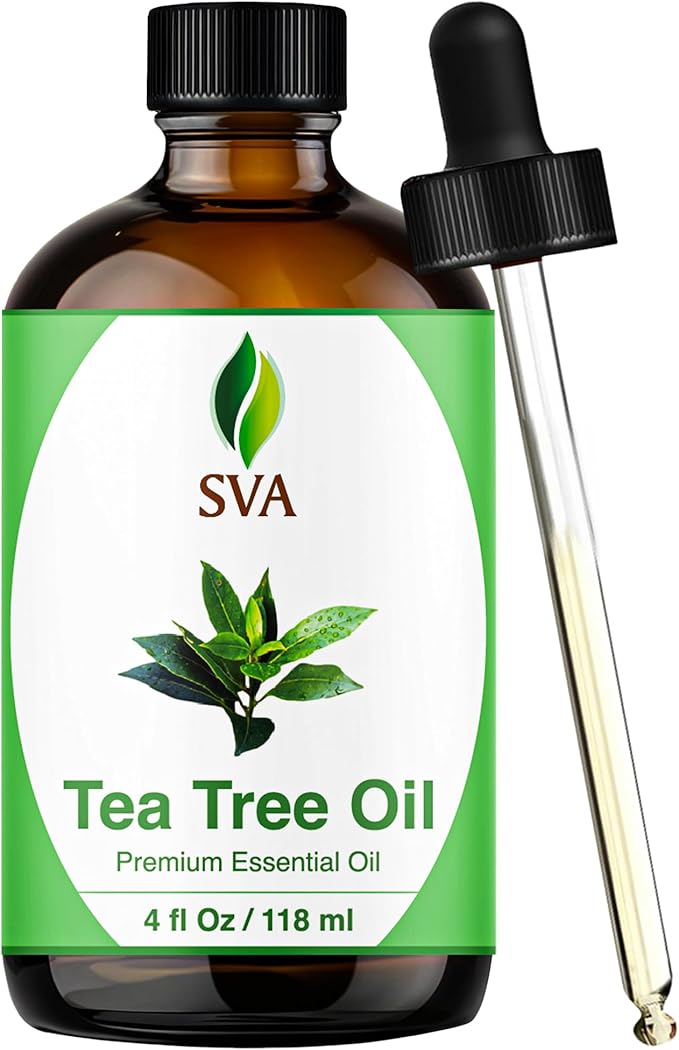
Tea Tree Essential Oil
Premium Quality Tea Tree Essential Oil: SVA Tea Tree Oil 4oz is an essential oil and is obtained by steam distillation of Melaleuca Alternifolia leaves. Our Tea Tree oil is free of preservatives and comes with a dropper for easy application. It is not tested on Animals. We care for you
